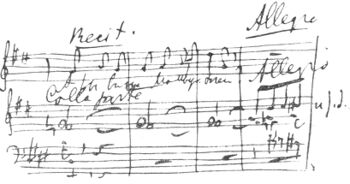Letter 3361
| Date | 21 September/3 October 1887 |
|---|---|
| Addressed to | Emiliya Pavlovskaya |
| Where written | Maydanovo |
| Language | Russian |
| Autograph Location | Moscow (Russia): Bakhrushin State Central Theatre Museum (Pavlovskaya collection) |
| Publication | Жизнь Петра Ильича Чайковского, том 3 (1902), p. 182 (abridged) Чайковский на Московской сцене (1940), p. 408–409 П. И. Чайковский. Полное собрание сочинений, том XIV (1974), p. 223–224 |
Text and Translation
| Russian text (original) |
English translation By Luis Sundkvist |
21 сент[ября] [18]87 года Майданово Дорогая Эмилия Карловна! Если б Вы знали до чего мне больно и трудно после мучительнейшей работы купюр и переделок снова что-то такое менять! Я так устал от придумывания перемен, что ей-Богу, не знаю что и отвечать на последнее письмецо Ваше. Думаю, что касательно речитатива: «а ты вина, Мамыров, хочешь?» — можно просто сделать так: Кума Что касается стр[анице] 78, то ей-Богу решительно не знаю что тут сделать. Ведь нужно все совершенно пересочинить, дабы вышел свободный речитатив!!! Между тем, мне кажется, что если дать Вам свободу, т. е. заставить оркестр идти colla parte, то ничто Вас не стеснит. Голубушка моя! Спросите совета У Э. Ф. Направника. Вы знаете, что я спорить не люблю и подчинюсь необходимости, если и он заставит заодно с Вами. Но только уж подождите до Петербурга! В эту минуту я решительно не в состоянии. Решается очень важное дело в моей жизни; я очень расстроен и испытал ужасное разочарование. Расскажу при свиданье. Завтра еду в Москву и там буду ожидать, чтобы меня вызвали в Питер. Разумеется, я выеду как только потребуете, но чем больше можно оставить меня в Москве, тем лучше. Целую Ваши ручки. П. Чайковский Какая Вы, ей-Богу, милая и добрая! и как я Вам благодарен за сообщения Ваши о репетициях! |
21 September 1887 Maydanovo Dear Emiliya Karlovna! If you knew how painful and difficult it is for me, after all that excruciating work on the cuts and modifications, to have to make such changes again! Coming up with these modifications has so worn me out that, truly, I do not know what to reply to your last little letter [1]. I think that, regarding the recitative "Do you want wine, Mamyrov?", one could simply have it like this: Kuma As for p. 78, truly, I just do not know what could be done here. I mean, it would be necessary to compose everything entirely afresh in order to turn it into a free recitative!!! However, it seems to me that if you are given leeway here, i.e. by having the orchestra play colla parte [2], then there is nothing that can constrain you. My dear! ask E. F. Nápravník for advice. As you know, I don't like quarrelling and I shall submit to necessity if he concurs with you and forces me. But please just wait until I am in Petersburg! At this moment I am simply unable to do this. A very important matter in my life is now being decided [3]. I am very upset and have suffered a terrible disappointment. I shall tell you about it when we meet. Tomorrow I am going to Moscow, and I shall wait there until I am summoned to Piter. It goes without saying that I'll come as soon as you demand it, but the longer you can leave me in Moscow, the better it will be for me. I kiss your hands. P. Tchaikovsky My God, how sweet and kind you are! And how grateful I am to you for letting me know about the rehearsals! [4] |
Notes and References
- ↑ In her letter to Tchaikovsky of 19 September/1 October 1887 Emiliya Pavlovskaya had reported on the successful rehearsal of Act I of The Enchantress earlier that day, but also pointed out some passages in Nastasya's accompanied recitative in which she found it very difficult to keep in tempo with the orchestra. She asked Tchaikovsky to allow her to sing one particular phrase flexibly (without orchestral accompaniment). Pavlovskaya's letter has been published in Чайковский на московской сцене (1940), p. 407–408.
- ↑ Italian: synchronized with the vocal part.
- ↑ This refers to the negotiations Tchaikovsky was conducting, with the help of Jurgenson, for the purchase of a plot of land in Maydanovo so that he could build his own house on it — note by Vasily Kiselev in Чайковский на московской сцене (1940), p. 409.
- ↑ This note was added at the top of the first page of the letter.

